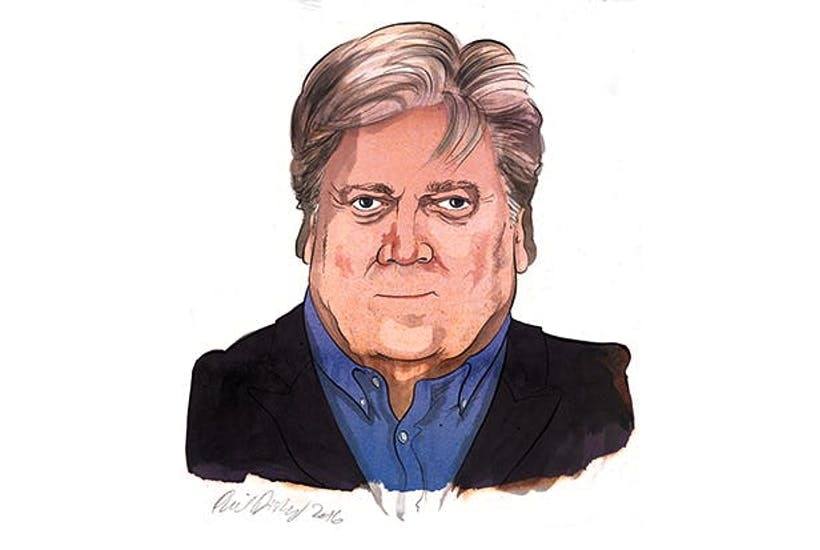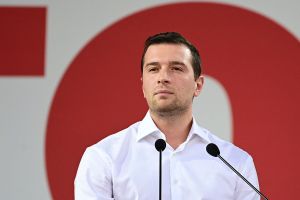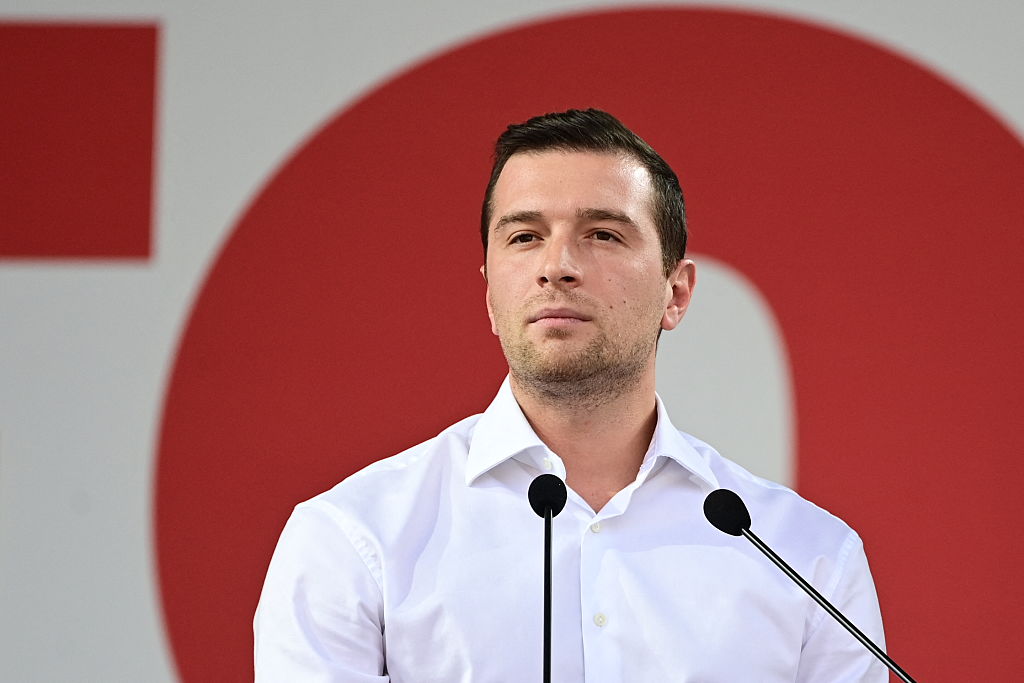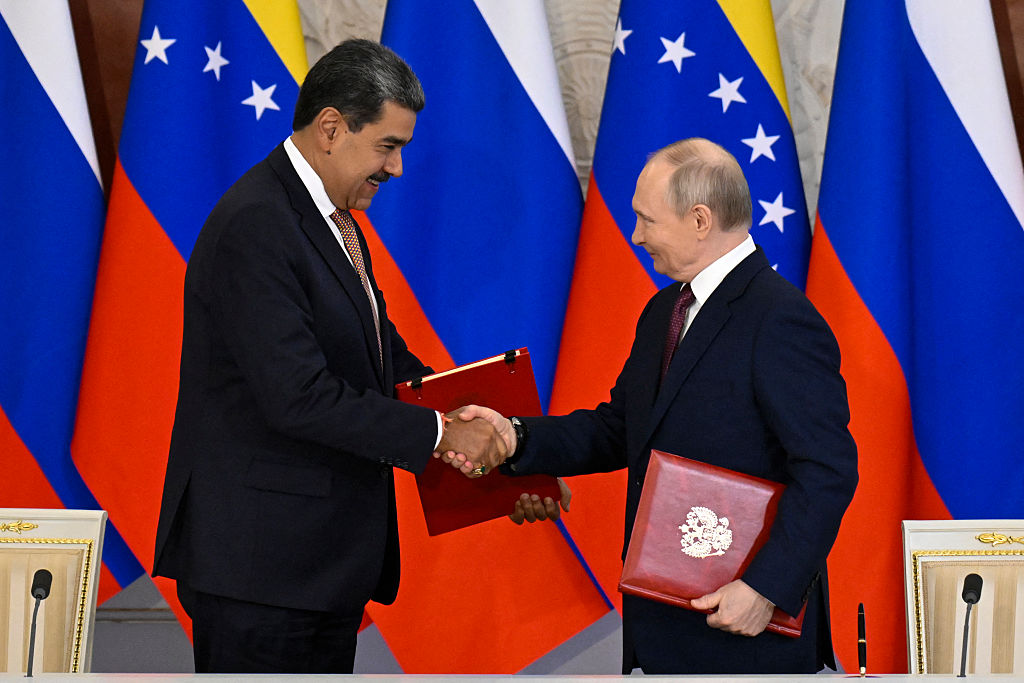We are in a hotel suite at the Park Hyatt Hotel in Zurich when Stephen K. Bannon tells me he adores the fascist dictator Benito Mussolini.
But let’s be clear. Bannon — as far as I can tell — is not a fascist. He is, however, fascinated by fascism, which is understandable, as its founder Benito Mussolini, a revolutionary socialist, was the first populist of the modern era and the first tabloid newspaper journalist.
Il Duce, realising that people are more loyal to country than class, invented fascism, which replaced International Socialism with National Socialism. He was thus able to ‘weaponise’ — to use a favourite Bannon word — what the people wanted. Bannon is now touring Europe to weaponise what lots of European people seem to want, which is national populism.
Mussolini was perhaps the reason Bannon granted me an interview. It turns out he likes a book I wrote about the dictator years ago.
‘How many guys have you interviewed who have read your biography?’ he asked. ‘Am I the first?’
Had he really read it? ‘I have, definitely … I haven’t read all the old biographies but it’s the only modern one that treated Mussolini as … one of the most important figures of the 20th century. You put the juice back in Mussolini. He was clearly loved by women. He was a guy’s guy. He has all that virility. He also had amazing fashion sense, right, that whole thing with the uniforms. I’m fascinated by Mussolini.’
Before going to Zurich, where he had been invited by Die Weltwoche, the Swiss magazine, to speak about populism, Bannon had spent several days in Italy during the run-up to the general election on 4 March: ‘the most important thing happening politically in the world right now,’ he told the media.
As if to prove him right, the Italians duly voted in huge numbers for populists, in particular for the Five Star Movement (M5S) which got 33 per cent, and its opponents Matteo Salvini’s La Lega, which got 18 per cent.
Bannon defines Silvio Berlusconi’s Forza Italia (La Lega’s main ally in the Coalition of the Right), which won 14 per cent, as populist in order to claim that ‘two thirds’ of Italians voted for populist parties and to demonstrate that populism in Europe is on a roll. Or as Bannon told his Zurich audience, ‘The populist surge is not over: it’s just beginning.’
Bannon, an ex-US Navy lieutenant, Goldman Sachs banker and Hollywood film producer, is 64 and a practising Catholic and ‘Christian Zionist’. He has been married and divorced three times and has three daughters. After making money from films, he took over Breitbart, the right-wing website, and then in 2016 became chief executive of Donald Trump’s successful election campaign. He then spent seven months in the White House as the President’s chief strategist.
He now calls himself ‘a fire-breathing populist’. For his many enemies, he is the bitter end. When he spoke in Zurich to a sellout audience of 1,500 people there was a large and angry anti-fascist demonstration outside the conference hall and riot police everywhere. According to its opponents, populism is the new fascism. So — is it?
‘This is all theoretical bullshit. I don’t know. Populism, fascism — who cares? It’s a media smear of the populist movement.’
Donald Trump, I suggest, can’t be a fascist, as he does not want to replace democracy with dictatorship, nor is he left-wing, as was fascism.
‘The bigger threat we have got than socialism is state-controlled capitalism, which is where we’re headed, where we have big government and a handful of big companies. That’s what you’re seeing in technology right now with these massive companies. It’s the biggest danger we have.
‘Listen, I think our problem is [not just] the cultural Marxist left, but state capitalism on finance. That’s what we’re fighting right now.
They absolutely control our borders. They debase your currency, they debase your citizenship, and they take your personhood digitally.
‘This is the new serfdom. We’re just a collection of serfs — serfs living at a higher standard of living, but vis-à-vis what the total economic pie is, you’re still a serf, and that’s exactly where the modern state wants to keep you.’
Bannon is adamant that populism and fascism ‘are not even related’. ‘That’s just a smear. Look at the Gracchi brothers in Rome, Tiberius and Gaius, the greatest populists we ever had. They were not fascists. People are naturally not fascist. Come on, dude, you’ve got to know your Roman history? The brothers Tiberius and Gaius Gracchus … they’re not fascists, they’re populists.’
That’s quite a highbrow allusion, I say: isn’t citing Roman history way above every-one’s heads? ‘Why? No, you see here’s the problem. You want to talk down. This is what’s happening to us. I want to raise the bar and get back to classical allusions because I come from a blue-collar family that reads Plutarch.’
He goes on: ‘Lincoln had the King James Bible, Plutarch’s Lives of the Noble Greeks and Romans and the plays of Shakespeare, that’s all he had, that’s what he read non-stop. He didn’t go to 20 years of school, he didn’t have a PhD in English. In the height of our civilisation, in England and other places, working men had reading associations. Churchill could make classical allusions and the Labour vote knew exactly what he was talking about. We’re not going to dumb it down, OK? I’m not going to let you dumb it down.’
Britain and Brexit loom large in Bannon’s revolutionary vision. ‘Brexit would not have happened if Breitbart London had not started,’ he claims, referring to the UK edition of his website which was launched in 2014. ‘We were the platform for Ukip ideas, particularly immigration.’
‘Without Farage, you wouldn’t have had a Brexit. Boris Johnson, that exit campaign — he’s a great guy but they were pitching those complicated rules from Brussels. It didn’t wash. It was immigration. It was Nigel Farage and the brothers coming in.’
Brexit, in Bannon’s view, is an expression of national populism. It’s about ‘subsidiarity’, taking power away from the state and giving it back to the common man: ‘You stop ceding decisions to a scientific, engineering, financial, managerial, technocratic elite, which is how globalism came about.’
Why does he think the nation state is so important? ‘Because it’s the basic building block of citizenship.’ I tell him I had come by train from Italy to Switzerland, which is not in the EU, to see him and no one had asked to see my passport, thanks to Europe’s open borders. ‘It can’t last,’ he says. ‘Italy showed you that.’
The elites — or ‘Davos Man’, as he calls them — are afraid of populism because they are afraid of power going to the people. ‘The biggest panic they’ve got is what happened to Italy on Sunday, where people stood up and said, ‘Do you know what, we’re not going to do that any more. That’s what they fear.’
Bannon is not too fussed about left and right. He likes anger. He likes Beppe Grillo’s techno-anarchist Five Star Movement because ‘they are kinda making it up as they go along’.
‘They started off as a pure protest vote: we want to stop the crony capitalism. The combination of a permanent political class in bed with the banks and in bed with the corporations that basically gutted the Italian people — we want that stopped and the first thing we’ll do is break up the politicians.
‘Anger is a great weapon. That’s why Grillo was brilliant. They’ve come from nowhere to 33 per cent of the vote. It’s amazing. And by the way, they’re internet-based and on very little money.’
We’re running out of time. Bannon has places to go and people to see, the global national populist revolution to fight. ‘This is called capitalism, man, they’ve got you on the clock all the time,’ he says. We rattle through the last questions.
Can the West live with Islam? ‘Yes. Islam not only will survive, it can have a place in the West and there is nothing about banning Muslims. Now the radical jihadist part — the supremacist Islam part — is a different deal, but no, we can live with Islam, we’ve got to live with Islam.’
Does he miss the White House? ‘No, not at all. I hated every day. I’m not a staffer.’
Why is he in Europe? ‘I’m here to observe and learn. The 2014 elections in the European Parliament, then Brexit, taught me so much that had to do with the populist revolt in the United States, and I was able to apply some of those lessons. I’m learning so much about populism.’
Bannon is reluctant to talk about his former boss, the US President. Will Trump be impeached? ‘That’s a ridiculous question — no, he’s not going to be impeached. President Trump is going down the path of fulfilling now that he has pivoted back to economic nationalism: he is going to hold the House in 2018, pick up a couple of seats in the Senate, and he is going to run again and win with over 400 electoral votes.’
When did he last speak to Trump?
‘I can’t say that.’
Does he speak to him at all?
‘Our lawyers talk because it’s the middle of an investigation. I don’t talk to the President.’ Why not? ‘Because it’s better that we don’t chat.’
So it’s nothing personal then?
‘Absolutely not, I have great admiration for the President. I like Trump a lot — he’s a good man, he’s a great guy.’
Isn’t Trump a sexual molester? A Weinstein? ‘No, that is totally ridiculous.’ Bannon adds that, after the infamous Billy Bush ‘Grab ’em by the pussy’ recording of Trump came out, he advised Trump not to apologise. ‘It’s locker-room talk,’ he says, which is the line that Donald Trump famously used to defend himself after he had apologised.
He’s leaving.
What about the matriarchy, I ask. ‘I got to go,’ he says. ‘Isn’t your politics all just about male insecurity?’ I ask. He stops.
‘The Time’s Up movement is coming to the heart of the structure of global society because all global society is built on the patriarchy: Confucian society, the societies in Africa, the societies in the subcontinent of India, and the Judeo-Christian West, that’s just a fact, OK, and that is why this thing is like the French Revolution. I’m not opining whether it’s right or wrong.’
Does he want women to stop working and make babies? ‘Women should do whatever they want, like my daughter went to West Point and served with the 101st Airborne in Iraq. We have an economy where if a woman wants to stay home and be a mother, she ought to have that opportunity. But it’s 100 per cent on what young women want to do, and they should be able to have every opportunity to do everything they want to do, including serving in combat, which I’m a big believer in.’
What about guns?
‘Guns are not a problem.’
But Donald Trump appears to be proposing some measure of gun control. Would he accept that if Trump delivered the economic nationalism he pines for? Would he swap some gun control for strong borders?
‘No, that’s ridiculous … I don’t agree with any stop on guns. It’s not a gun issue, you can’t fold on guns — you can’t. You British don’t like guns, that’s the problem.’
From Zurich, Bannon went back briefly to Italy, and from there to France, where he shared the stage with Marine Le Pen in Lille at the annual congress of the Front National. ‘What I’ve learned is that you’re part of a worldwide movement that is bigger than France, bigger than Italy, bigger than Hungary — bigger than all of it,’ he told the audience. ‘And history is on our side.’
Nicholas Farrell is the Spectator’s Rome correspondent


























